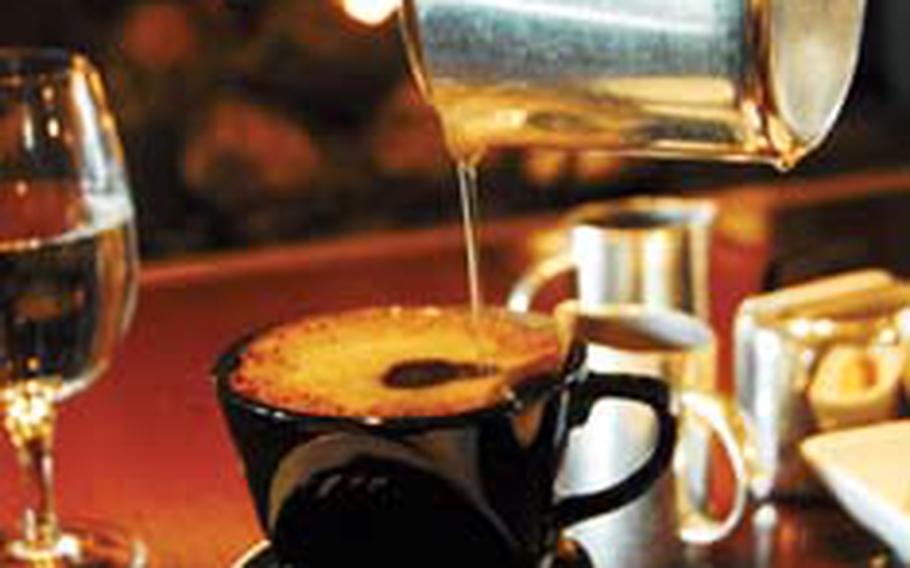
A server at The Library, a lounge at the Shilla Hotel in Seoul, pours water into a strainer of ground Kopi Luwak beans. The coffee, which costs 35,000 won ($28) a cup, is made from beans harvested from the feces of civet cats and is considered a delicacy among coffee lovers. (Ashley Rowland / S&S)
You might be used to getting your morning cup of coffee from a machine. But you can now get it from a furry animal that climbs trees — the Indonesian civet cat, to be precise.
Or to be even more precise, what the civet cat leaves behind in its litter box.
The coffee beans that this kitty eats and excretes are used to make Kopi Luwak — the rarest and most expensive coffee in the world — and I couldn’t pass up a chance to sample a cup at Seoul’s ritzy Shilla Hotel.
The rare Luwak coffee beans cost $700 to $800 a kilogram and are usually blended with less expensive beans. But the Luwak coffee served at the Shilla is a pure blend, hence the hefty price tag — 35,000 won, or about $28, a cup. Add the service charge and tax, and it’s closer to 45,000 won a cup.
Why so expensive? The discriminating civet cat — something of a cross between a long-nosed raccoon and a housecat with fangs — eats only the ripest beans. The cats are nocturnal, which might explain their penchant for coffee beans.
As the beans pass through the cat’s digestive system, they lose their bitter taste and, sadly, much of their caffeine. Left behind in the piles of poop are intact beans that coffee connoisseurs go wild over.
I, apparently, am not a coffee connoisseur.
My cup of Kopi Luwak smelled like your average cup of coffee. It looked like your average cup of coffee. But for someone used to drinking a few pedestrian cups of Starbucks each week, it didn’t taste like anything special. Just a normal cup of joe, although I estimated that each dung-seasoned sip cost about $1.
Our translator did notice that the coffee — brewed in a strainer at your table and served inky black — was mild for a cup so dark. The bite-size cookies that came with it were actually the highlight of our coffee break.
About five to eight people a day order Luwak coffee, usually after dinner, said Barbie Yoo, manager of The Library lounge. Most are male executives in their 40s and 50s, and they always love it, she said. Most describe it as having a rich but soft aroma, no bitterness, and a sometimes slightly sour aftertaste.
"Some said they cannot drink other coffee after having this coffee," she said.
Customers crack the expected jokes about the coffee being made from and tasting like, er, excrement. She assures them that it’s hygienically collected and processed.
We didn’t see anybody else drinking Kopi Luwak while we were at the Shilla. And none of the signs advertising it as the "world’s best coffee" mentioned that it was made from a byproduct of fecal matter.
"I think I wouldn’t drink it even if it was free," said Thomas Amstutz, a Swiss investment banker, when I told him where our coffee beans had been.
Alex Park, a Korean-American, said he tried Kopi Luwak out of curiosity but didn’t like it because it was too mild, although his mother enjoyed it. He said it tasted like paper — not fruity or nutty, but woody.
And it definitely didn’t taste like poop, the 27-year-old said. He didn’t realize what made the coffee unique until after he drank it.
"It is made of poo, but I’m pretty sure that they’ve made it safe," he said.
Stripes reporter Hwang Hae-rym contributed to this story.